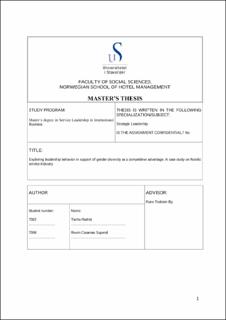| dc.description.abstract | This dissertation explores the leadership behavior and perspective through leadership
ontologies that support gender diversity to gain competitive advantage. The present and past
literature on diversity leadership is focused more on identifying to “fix” diversity with the
end goal of improving the KPI of the organization. Only a few studies have demonstrated the
leadership behaviors to embrace diversity as a strength, a source of value, and a competitive
advantage. Therefore, this research aims to fill this gap in the literature, as it focuses on the
leadership perceptions to get meaningful progress in the corporate gender diversity programs.
The research questions then become:
Which leadership behaviors support gender diversity to achieve competitive advantage?
A study aimed to answer this question and look at all three leadership ontologies: tripod
ontology, DAC, and PAC, and how they would function in the Nordic hotel and IT service
sectors. Empirical data was collected through interviews of employees in the formal and
informal leadership positions in 2 hotels and 1 IT company.
This dissertation has the world view of interpretivism, and the analysis is qualitative content
analysis. And the data reveals that there are six main themes of relevance to the problem
question. The findings suggest that tripod ontology, where leadership influences most of its
integration and expects followers and shared goals to follow, has adverse effects on gender
diversity in the hotel and IT industry. DAC ontology which focuses on collective interest,
coordination of knowledge and works and has a widespread agreement on the overall goals,
mission, and vision, has limited practice. Still, it can diversely affect the integration of gender
diversity in both industries. PAC ontology which defines leadership as a collective pursuit of
delivering on purpose, not a privilege of the few, has a mixed findings in this research. In the
hotel sector, leaders tried to implement gender equality within their organization in a way that
hasn’t had known to have a business value, on the other hand, the IT sector has an excellent
potential to implement PAC to integrate gender.
This dissertation is based on a paradigm that allows for consistent re-evaluation of the
problem question. However, the main recommendation is to develop the problem question
early and review the literature at a stage where one can utilize the literature to form a problem
question. In addition, this dissertation recommends the careful use of leadership definitions.
Because there are so much disagreement and vagueness among scholars in this field, this thesis also suggests combining leadership studies with quantifiable data besides qualitative
data. | |
